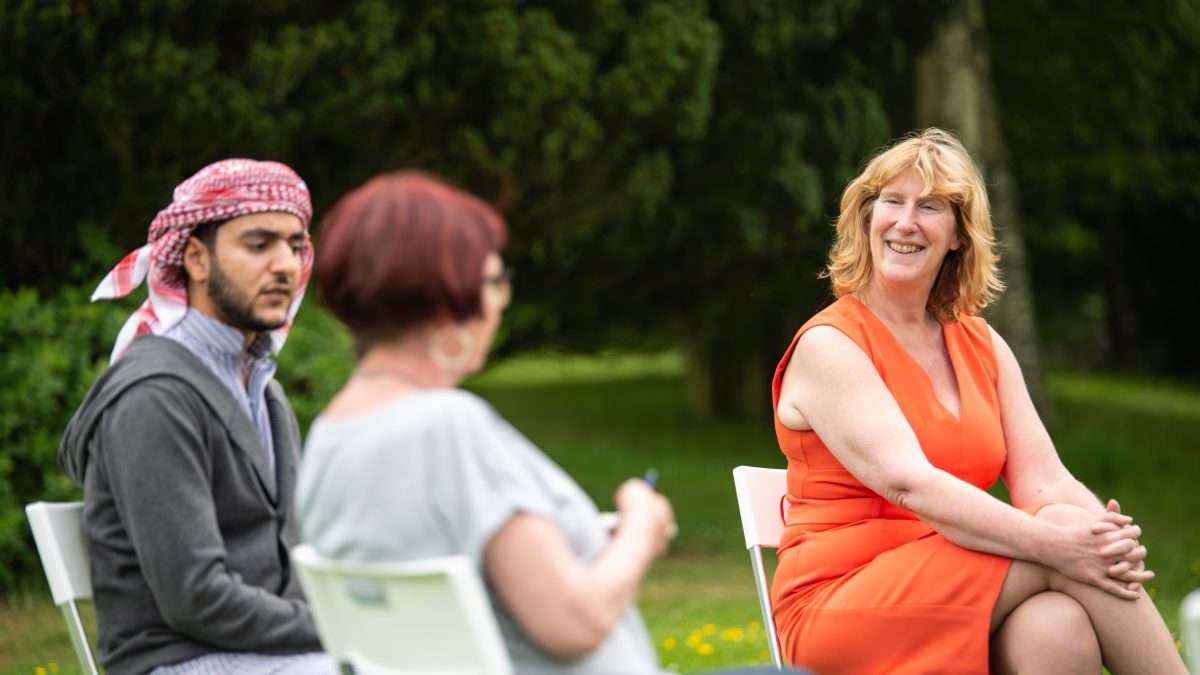
Programme Timetable at Castle Craig
What Does My Programme Look Like?
- All patients undergo a thorough biopsychosocial assessment and detoxification (if required).
- Patients are introduced to their focal therapist, who is assigned with the patient’s needs in mind,
- Then the right groups workshops and complementary therapies are selected depending on individual circumstances.
Every patient is an individual and has different needs and requirements. Our thorough biopsychosocial assessment shapes the personalised recovery plan for our patients.
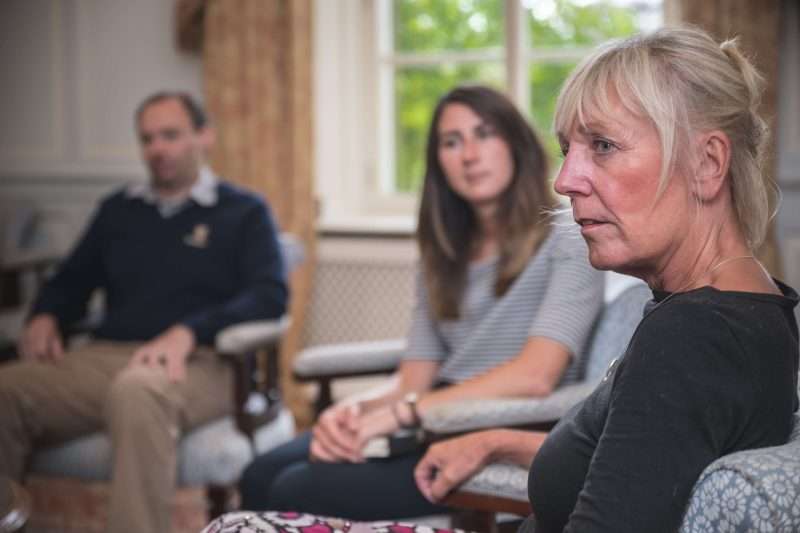
Example Programme Timetable
It’s difficult to put a set timetable of “weeks 1, 2, 3, 4 & 5” because everyone recovers at a different rate and is involved with various groups and workshops. Some will quickly embrace the 12 Steps and make quick progress, while others recover more slowly.
For example, if you are a female with an alcohol addiction who also suffers from PTSD, you would have a detoxification specific to alcohol withdrawal, you would attend the women’s only therapy groups, trauma groups, AA groups, and possibly EMDR and DBT. Your length of stay would also be recommended around your personal circumstances.
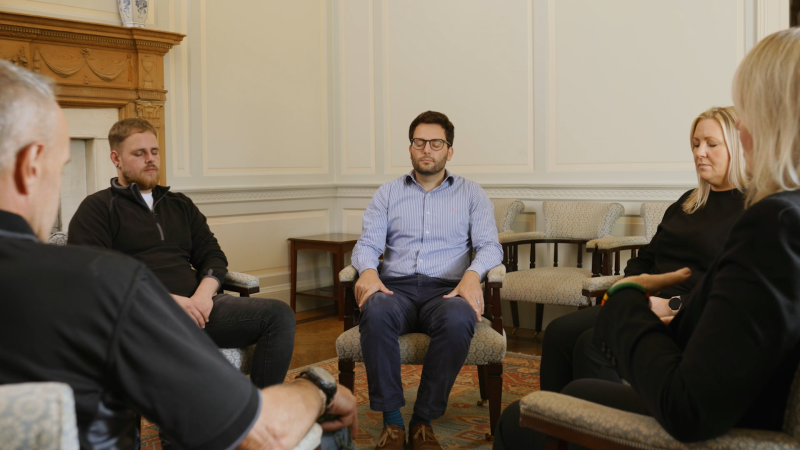
Morning
Mornings begin with a continental or cooked breakfast, an early mindfulness session or a reflection and a visit to the nurses at the medical centre if needed. At around 9am patients meet in the Library for a psychoeducational presentation which may be either delivered by a therapist or occassionally delivered digitally. During these talks you will learn more about addiction, patterns of behaviour, triggers to avoid relapse, and recovery tools. The main goal of a morning routine is to introduce a manageable, simple routine that creates healthy habits for the rest of your life.
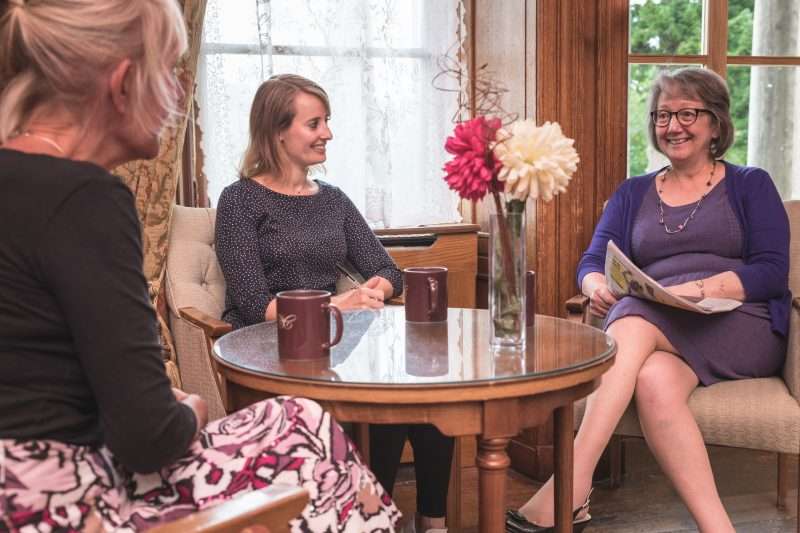
Late Morning
Psychoeducational talks are followed by a short break and group therapy. Morning groups are usually split into male and female and are always led by a therapist. Groups are no larger than 10 so that everyone has a chance to contribute and gain from it. After group therapy there is time for walking, reading, one-to-one therapy sessions, a gym session or a visit to the onsite shop.
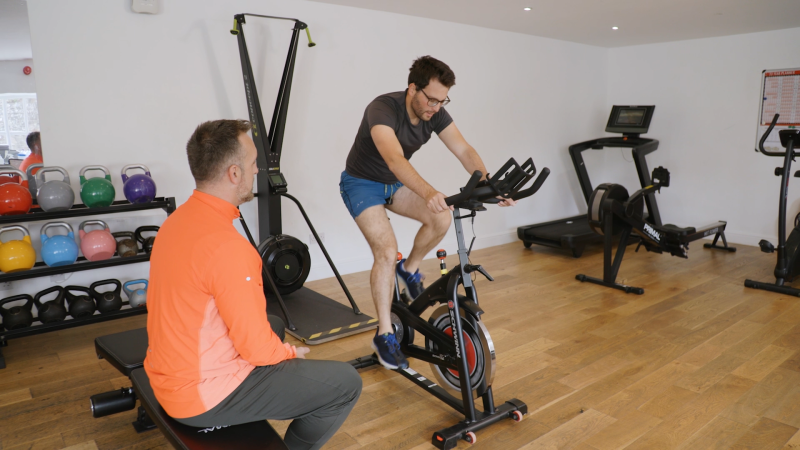
Afternoons
After some lunch there are planned group therapy workshops, specialised sessions for co-occurring disorders such as trauma and grief, or behavioural addictions such as gambling. Additionally sessions of complementary therapies such as mindfulness, alpaca walking, drumming or equine therapy take place. Twice a week, you will have your individual therapy sessions.
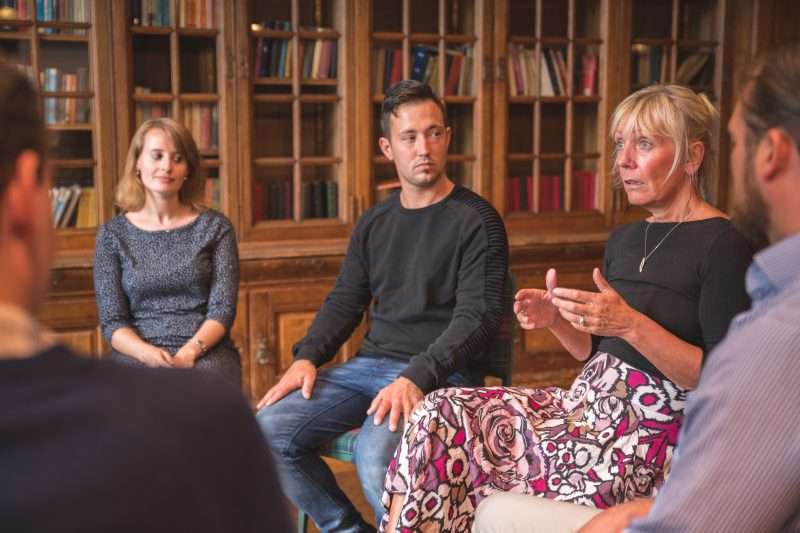
Evenings
There may be 12 steps/NA, AA meetings and self-reflection periods after dinner. The evenings can also involve short group sessions intended for people to share and reflect on the day.
The day will usually end around eight in the evening or nine, leaving you some free time and a chance to reflect and settle down. If you have trouble sleeping, you might receive some acupuncture from a trained nurse.
Foundation Programme
| Time schedule | Therapeutic Activity |
|---|---|
| 08:00 | Breakfast |
| 09:00 | Lecture: Challenges of Stress in Recovery |
| 09:45 | Group Therapy |
| 11:00 | Own time /Gym |
| 12.00 | Lunch |
| 14:15 | Individual Therapy |
| 15:00 | Addiction (e.g. Gambling) Group or Yoga and stretching |
| 16:00 | Recovery Workshop: Mindfulness |
| 17:30 | Dinner |
| 18:00 | Own time |
| 19:00 | Cocaine Anonymous Meeting |
| 20.30 | End of Day Reflection |
Advanced Programme (Extended Stay)
| Time Schedule | Therapeutic Activity |
|---|---|
| 08:00 | Breakfast |
| 09:00 | Lecture: ‘Co-Dependency’ |
| 09:45 | Group Therapy |
| 11:00 | Alpaca Walking |
| 12:00 | Own time / Fitness Activity |
| 12:30 | Lunch |
| 13:30 | Specialist Group: Behavioural Addictions/Specialist Group: Grief |
| 14:00 | Fitness Activity |
| 14:15 | Specialist Group: Mindfulness |
| 15:00 | Own time / Yoga & Breathing |
| 15.30 | Peer Evaluations / Assignments |
| 16:00 | Recovery Workshop: ‘Mindfulness’ |
| 19:00 | Group Sharing |
| 21:00 | End of Day Reflection |
Programme Model
- Therapy and Counselling Sessions: Individual and group counselling sessions are provided daily. These will be crucial in helping people express themselves, face reality and take responsibility for their recovery. A trained therapist leads sessions to ensure safe and appropriate procedures.
- Educational Programmes: These are designed to teach you about the disease of addiction and what you can expect during your treatment and continued recovery.
- Life Skill Training Sessions: You will learn and practice the vital recovery skills and coping methods needed to meet the challenges of a life lived in a new manner.
- Nutrition Planning: Physical health is important during your stay and will help you with your ongoing recovery. Structured meal times and balanced diets are an important part of our addiction programme. Acquiring healthy eating habits regulates blood nutrient levels and enhances well-being.
- Fitness Regimes: Structured exercise programmes are designed to keep individuals active, healthy, and happy. Exercise can be a great way to curb cravings and improve moods.
- Complementary Therapies And Holistic Techniques: Here at Castle Craig, we have amenities such as massage treatments, kinetic chain release, acupuncture, hand massage, hyperbaric oxygen and much more. We can also offer specialised therapies such as art and equine therapy to balance the mind and body.
- Support Group Meetings: These are in-house fellowship meetings with your peers following the 12-step model first proposed by Alcoholics Anonymous. Using the principles of honesty, openness, and willingness to change, such groups build trust, fellowship, and self-esteem through the simple process of sharing their experience, strength, and hope. They represent one of the most successful and powerful aids to recovery ever devised.
- Family Programmes: Addiction is a family disease, and family involvement is vital. Some education on the nature of addiction and its treatment is usually helpful. In addition, family members can openly and honestly discuss their issues over past behaviour and the way ahead to make the recovery journey a lot easier.
- Own Time: Time on your own for self-reflection, therapy assignments, time to relax and chat to other patients, and to stretch your legs, is important too. This is also factored into the day so that your time with us is well-balanced.

Through the warmth of genuine human connection you can find the strength to conquer your struggles.
Get Help Today
One thing you can rest assured with us here at Castle Craig is that we care – we want you to thrive and become the best version of yourself. So many of us have experienced what you are experiencing, and we know that it works if you want it to.
We’ve had decades of experience in helping people suffering from addiction disorders as well as many other mental health problems. We’ve always accepted the challenge of helping people when they cannot help themselves because we believe that all life is important and worth saving.
How We Encourage The Recovery Process:
Peer support is a huge part of the recovery process – everyone here is in the same boat as you are, and people who have been here for 5-8 weeks pass on their knowledge of their process to empower people who are in their first and second week
Many people are reluctant to do more than 28 days when they call us, but when they start the programme, they begin to understand the benefits of staying longer and extending their programme, particularly if they have a dual diagnosis.
CATCH Recovery is a leading outpatient clinic in London that provides exceptional addiction treatment services for patients struggling with substance misuse disorders. The clinic offers personalised treatment plans that are tailored to meet the unique needs of each patient, with a team of highly trained and experienced addiction specialists who work closely with patients to help them achieve long-term recovery.

Download Our Brochure
As a trusted partner of Castle Craig, one of the UK’s leading residential addiction treatment centres, CATCH Recovery offers a seamless continuum of care for patients transitioning from residential treatment to outpatient care. This ensures that patients receive the best possible support and care throughout their recovery journey.
Experts You Can Trust
With a wealth of knowledge and services to help you regain control of your life, request a call-back from one of our professionals today. The choice you make today could change your life forever.